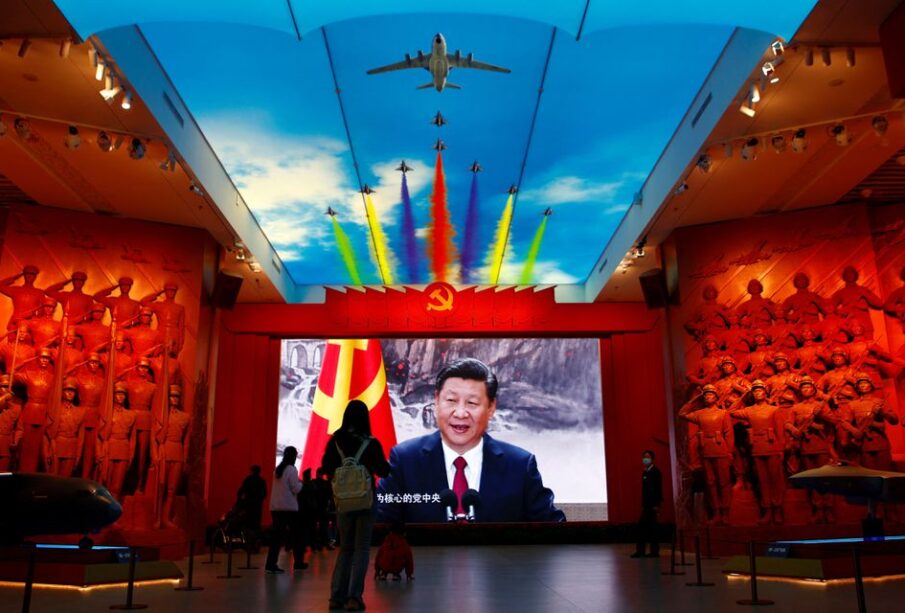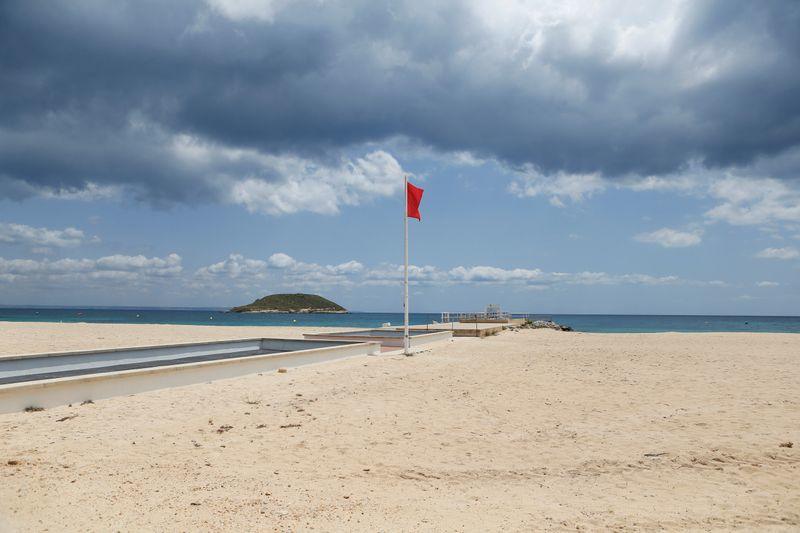China Xi’s new generals offer cohesion over possible Taiwan plans
 Visitors stand in front of a giant screen displaying Chinese President Xi Jinping next to a flag of the Communist Party of China, at the Military Museum of the Chinese People's Revolution in Beijing, China October 8, 2022. REUTERS/Florence Lo/File Photo
Visitors stand in front of a giant screen displaying Chinese President Xi Jinping next to a flag of the Communist Party of China, at the Military Museum of the Chinese People's Revolution in Beijing, China October 8, 2022. REUTERS/Florence Lo/File PhotoChinese President Xi Jinping’s new generals may have been selected for their political loyalty to him, but those ties could serve at least one vital military purpose in any Taiwan invasion plan: ensuring cohesion and decisiveness.
Although the Politburo’s seven-man Standing Committee would make the ultimate decision on any Taiwan action, the Central Military Commission would forge and execute the battle plan, eight Asian and Western military attaches say.
Three new generals were appointed to the top command body on Sunday after the Communist Party’s five-yearly congress – an event at which Xi said China would “never promise to give up the use of force” to take control of the self-ruled island.
Four security analysts and four military attaches say Russia’s Ukrainian quagmire has shown how vital speed – both in build-up and execution – would be to any Chinese plan, in part to prevent Taiwanese forces and international support from mobilising.
“If Xi Jinping is going to the pull the trigger on Taiwan, then he can’t afford any dissent from the Central Military Commission,” said Singapore-based strategic adviser Alexander Neill.
“To secure any kind of advantage they would have to move fast, lightning fast,” Neill added. “There is no room for dithering. That has always been Chinese thinking on Taiwan, and the Ukraine stalemate has confirmed the need to avoid getting bogged down in a slow logistical build up.”
In his first two terms, Xi purged thousands of officers on corruption allegations and has attempted to tighten the party’s control over the military.
Xi further strengthened his grip on his military command, with three new generals appointed to the seven-person commission and an extension beyond retirement age granted to his closest military confidante, General Zhang Youxia.
“This breaking of precedent is being used to his advantage to achieve two aims at once,” said James Char, a military scholar at Sinagpore’s S. Rajaratnam School of International Studies, referring to keeping Zhang in his post past retirement. “To ensure the PLA’s top soldier is someone well-versed in operational command and is politically reliable.”
The Chinese Defence Ministry did not respond to questions from Reuters.
Some analysts and attaches described the commission as a tightly interconnected group that blends operational experience and political loyalty while maintaining a link to China’s last shooting war, against Vietnam.
Zhang, 72, is described in the Pentagon’s 2021 report on China’s military modernisation as a People’s Liberation Army “princeling” whose father served with Xi’s father at the end of the Chinese civil war in 1949.
One of Zhang’s proteges, General Li Shangfu, was also promoted to the commission. Crucially, Li has experience with the People’s Liberation Army’s digitised strategic support forces, a body that covers electronic, cyber and space warfare.
General He Weidong will serve as the second vice-chairman below Zhang. He was promoted to the position after his command of the reformed Eastern Theatre Command, which is responsible for Taiwan operations.
He oversaw the unprecedented military drills and missile tests surrounding Taiwan in August that Beijing unleashed to protest the visit to Taipei by U.S. House of Representatives leader Nancy Pelosi.
General He is widely known to be connected to Xi through his service in the former 31st Group Army in Fujian during Xi’s time in that province, which faces Taiwan.
It is a background He shares with leading political commissar Admiral Miao Hua, who remains on the commission.
The new line-up straddles a military generation, given the promotion of General Liu Zhenli, who has been in command of forces around Beijing and has experience in the People’s Armed Police, China’s internal security forces.
Liu, 58, along with Zhang, has combat experience dating to the ill-fated conflict with Vietnam, which rumbled on to the late 1980s.
“That link to the problematic Vietnam campaign is a reminder that for all of the PLA’s advances in recent years, there is a glaring lack of modern combat experience,” said one Asian military attache, speaking on condition of anonymity.
“All the drills, exercises and parades can’t replace that. As cohesive as this team might be, there are glaring questions about the PLA’s ability to wage war – for them, and for those of us on the outside looking in,” added the attache, speaking on condition of anonymity because of the sensitivity of the matter.
Which member of the commission will serve as Defence Minister, replacing the retiring Wei Fenghe, will emerge when the National People’s Congress confirms a new governing team in March.
The position, which includes an extensive military-diplomatic role, is seen as less crucial than the work of the commission itself, which operates amid strict secrecy out of an imposing command centre in western Beijing.
SOURCE: REUTERS










